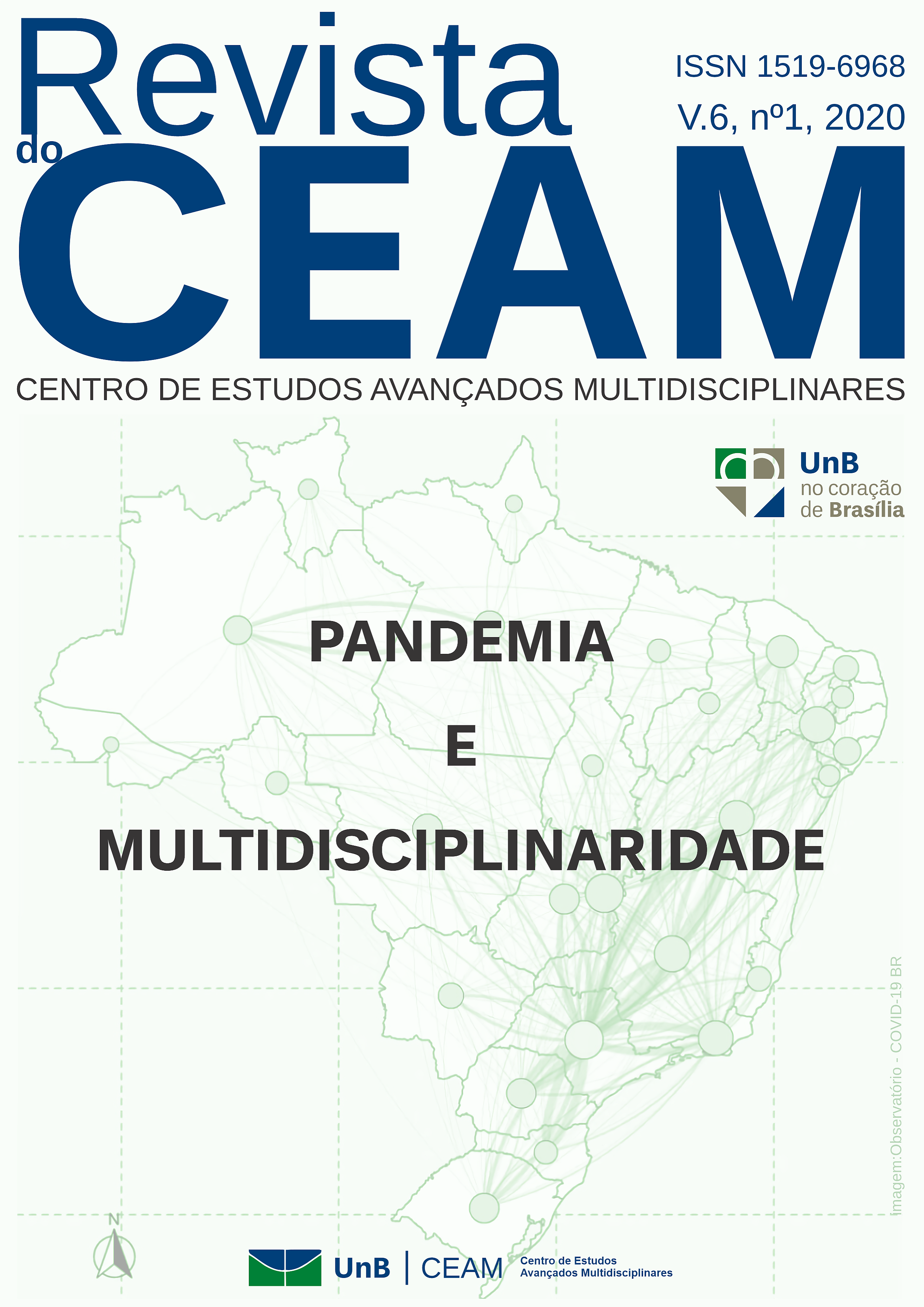COVID-19 and the Pandemic Context
Planning and Implementing an Interdisciplinary Unit of Learning
DOI:
https://doi.org/10.5281/zenodo.3955411Keywords:
Active methodology, Coronavirus, COVID-19, IBL, Interdisciplinarity, TDIC, Young agentsAbstract
In the Covid-19 pandemic, different generations have faced changes in different ways, subjectively and singularly, each person was influenced through their life history. For young people, social isolation, the main strategy to curb the spread of Covid-19, demands special attention. Considering the need to involve young people and bring them to the discussion of challenges and decision-making at this unusual moment in humanity, we plan an interdisciplinary project that aims to provide young people with knowledge of the historical, conceptual, operational processes of the virus and pandemic and its consequences in the social, health, educational, community, communicational areas, empowering them as a social agent in their community. The article describes the process of design and development of interdisciplinary methodology, IBL, PBL and the use of TDICs. The proposed methodology seeks to innovate in the construction of knowledge, generating in young participants an active and informative role that can influence people in their community.
Downloads
References
BARRON, B.; DARLING-HAMMOND, L. Teaching for Meaningful Learning: A Review of Research on Inquiry-Based and Cooperative Learning. Book Excerpt. Georoundation, 2008. Disponível em: <https://eric.ed.gov/?id=ED539399>. Acesso em: 20 mai. 2020.
BARRON, B. Achieving coordination in collaborative problem-solving groups. Journal of the Learning Sciences, v. 9, n. 4, p. 403”“436, 2000. Disponível em: <http://citeseerx.ist.psu.edu/viewdoc/download?doi=10.1.1.666.449&rep=rep1&type=pdf>. Acesso em: 19 mai. 2020.
BUENO, J. L. P.; GOMES, M. A. O. Uma análise histórico-crítica da formação de professores em tecnologias de informação e comunicação. Revista Cocar Belém, v. 5, n. 10, p. 53-64, 2011. Disponível em: <http://revistas.pucsp.br/emp/article/view/16952>. Acesso em: 20 mai. 2020.
BRASIL. Ministério da Educação (MEC). Base Nacional Comum Curricular. Brasília, DF: MEC, 2018. Disponível em: <http://basenacionalcomum.mec.gov.br/>. Acesso em: 5 mai. 2020.
EDELSON, D. C.; GORDIN, D. N.; PEA, R. D. Addressing the Challenges of Inquiry-Based Learning Through Technology and Curriculum Design. Journal of the Learning Sciences. v.8 n.3-4, p. 391-450, 1999. Disponível em: <https://www.tandfonline.com/doi/abs/10.1080/10508406.1999.9672075>. Acesso em: 18 mai. 2020.
FAZENDA, I. O que é interdisciplinaridade?. Org: Ivani Fazenda. São Paulo: Cortez, 2008. Disponível em: <https://filosoficabiblioteca.files.wordpress.com/2013/11/fazenda--org-o-que-c3a9-interdisciplinaridade.pdf>. Acesso em: 29 mai. 2020.
GOH, P.; SANDARS, J. A vision of the use of technology in medical education after the Covid-19 pandemic’, MedEdPublish, v. 9, n. 1, 2020. Disponível em: <https://www.mededpublish.org/manuscripts/2943>. Acesso em: 15 mai. 2020.
LINN, M. C.; McELHANEY, K. W.; GERARD, L.; MATUK, C. Inquiry learning and opportunities for technology. In: International handbook of the learning sciences Routledge. p. 221-233. 2018.
LOPES, R. M. et al. Características gerais da aprendizagem baseada em problemas. In: LOPES, R. M.; FILHO, M. V. S.; ALVES, N. G. (Orgs.). Aprendizagem Baseada em Problemas: fundamentos para a aplicação no Ensino Médio e na Formação de Professores. Rio de Janeiro, RJ: Publiki, 2019. p. 47-74. Disponível em: <http://bit.ly/aprendizagem2019>. Acesso em: 1 mai. 2020.
LORENZETTI, L.; DELIZOICOV, D. Alfabetização científica no contexto das séries iniciais. Revista Ensaio Pesquisa em Educação em Ciências, v. 3, n. 1, p. 45-61, 2001. Disponível em: <https://www.scielo.br/pdf/epec/v3n1/1983-2117-epec-3-01-00045>. Acesso em: 27 mai. 2020.
MARQUES, A. C. T. L.; MARANDINO, M. Alfabetização científica e criança: análise de potencialidades de uma brinquedoteca. Ens. Pesqui. Educ. Ciênc. (Belo Horizonte), v. 21, e10562, 2019. Disponível em: <https://www.scielo.br/scielo.php?pid=S1983-21172019000100303&script=sci_arttext>. Acesso em: 08 mai. 2020.
PEDASTE, M.; MÄEOTS, M.; SIIMAN, L. A.; DE JONG, T.; VAN RIESEN, S. A.; KAMP, E. T.; MANOLI, C.C.; ZACHARIA, Z. C.; TSOURLIDAKI, E. Phases of inquiry-based learning: Definitions and the inquiry cycle. Educational research review, v. 14, p. 47-61. 2015. Disponível em: <https://www.sciencedirect.com/science/article/pii/S1747938X15000068>. Acesso em: 03 maio 2020.
SASSERON, L. H.; CARVALHO, A M. P. Alfabetização Científica: uma revisão bibliográfica. Investigações em Ensino de Ciências, v. 16, n. 1, p. 59-77, 2011. Disponível em: <https://www.if.ufrgs.br/cref/ojs/index.php/ienci/article/view/246>. Acesso em: 12 mai. 2020.
SASSERON, L. H. Alfabetização Científica, Ensino por Investigação e Argumentação: relações entre Ciências da Natureza e escola. Ens. Pesqui. Educ. Ciênc., v. 17, n. especial, p. 49-67, 2015. Disponível em: <https://www.scielo.br/pdf/epec/v17nspe/1983-2117-epec-17-0s-00049.pdf>. Acesso em: 18 mai. 2020.
TAVARES, R.; ALMEIDA, P. Metodologia Inquiry Basead Science Education no 1o e 2o CEB com recurso a dispositivos móveis ”“ uma revisão crítica de casos práticos. Educação, Formação & Tecnologias, v. 8, n. 1, p. 28-41, 2015. Disponível em: <https://www.eft.educom.pt/index.php/eft/article/view/445>. Acesso em: 5 mai. 2020.
TORP, L.; SAGE, S. Problems as Possibilities: Problem-Based Learning for K-16 Education. Alexandria: ACSD, 2002.
UNICEF. Como adolescentes podem proteger sua saúde mental durante a pandemia. Estratégias para adolescentes que enfrentam uma nova (temporária) realidade. 2020. Disponível em: <https://www.unicef.org/brazil/historias/como-adolescentes-podem-proteger-sua-saude-mental-durante-o-surto-de-coronavirus>. Acesso em maio 2020.
VALENTE, J. A. A Comunicação e a Educação baseada no uso das Tecnologias Digitais de Informação e Comunicação. Revista UNIFESO ”“ Humanas e Sociais, v. 1, n. 1, p. 141-166, 2014. Disponível em: <http://www.revista.unifeso.edu.br/index.php/revistaunifesohumanasesociais/article/view/17>. Acesso em: 7 mai. 2020.
Downloads
Published
How to Cite
Issue
Section
License
Copyright (c) 2020 Germana Menezes da Nóbrega, Ana Júlia Pedreira, Wilsa Maria Ramos, Thalita Quatrocchio Liporini, Fernando William Cruz

This work is licensed under a Creative Commons Attribution 4.0 International License.
Autores mantém os direitos autorais e concedem à Revista do CEAM o direito de primeira publicação, com o trabalho simultaneamente licenciado sob uma Licença Creative Commons - Atribuição 4.0 Internacional, permitindo o compartilhamento do trabalho com reconhecimento da autoria do trabalho e publicação inicial nesta revista.









